Jack Skeffington in Yale Campus Press:
 In the introduction to Not Under Forty, Willa Cather’s 1936 collection of essays, she (in)famously writes that “the world broke in two in 1922 or thereabouts,” an opinion that, if nothing else, has fairly successfully separated her from the ranks of artists and authors we have come to call modernists.
In the introduction to Not Under Forty, Willa Cather’s 1936 collection of essays, she (in)famously writes that “the world broke in two in 1922 or thereabouts,” an opinion that, if nothing else, has fairly successfully separated her from the ranks of artists and authors we have come to call modernists.
…Cather’s The Professor’s House first saw print in 1925, in a post-Ulysses world whose literary landscape Cather no longer felt herself part of. The novel is largely concerned with one Godfrey St. Peter, the owner of the titular domicile, and his arrival at a point where his work, his marriage, his family, and (despite that title) both of his houses all enter a state of flux. Retreat into memory, especially memory concerning his favorite student, Tom Outland, forms a major portion of the Professor’s coping strategy, an so, in turn, the action of the novel.
In All That is Solid Melts into Air, Marshall Berman writes that modernity “is a paradoxical unity, a unity of disunity: it pours us all into a maelstrom of perpetual disintegration and renewal, of struggle and contradiction, of ambiguity and anguish. To be modern is to be part of a universe in which, as Marx said, ‘all that is solid melts into air.’”[2] Cather’s novel, as much as any other produced on either side of her supposed divide, participates in this uncertainty, in the exploration of a culture’s perceived experience of unified disunity, of a totalizing fracture. Despite Cather’s claim to have “slid back into the previous 7000 years,” The Professor’s House bears the marks of its era, telling the tale of a broken man in a distinctly fractured way.
More here. (Note: Watching Mad Men and reading Willa Cather’s deeply disturbing and insightful comments on the human condition in The Professor’s House was strangely satisfying. The book is startlingly fresh for present times.)
 Progress in the worlds of nutrition and everyday health has stalled, as has medicine to a more limited degree. We know a few things. You should exercise, avoid smoking, not be fat, and not jump off tall buildings. Besides that, there isn’t much we can tell you with certainty about what to eat and how to live your life.
Progress in the worlds of nutrition and everyday health has stalled, as has medicine to a more limited degree. We know a few things. You should exercise, avoid smoking, not be fat, and not jump off tall buildings. Besides that, there isn’t much we can tell you with certainty about what to eat and how to live your life.
 In the past 20 years, on economic measures, America has outperformed other rich countries. Over that period, median wages grew by 25%, compared with just 17% in Germany. Managers at Buc-ee’s, a Texas-based chain of stores, can make more than experienced doctors earn in Britain. But on a more fundamental measure of wellness—how long people live—America is falling behind. To its detractors, this is a cause for schadenfreude. “Many people say it is easier to buy a gun than baby formula in the us,” gloated a statement released by the Chinese Ministry of Foreign Affairs last year, which also pointed to declining life expectancy in general. In the past few years, according to some estimates, life expectancy in China overtook that in America. For Americans, that ought to be a more serious source of introspection than it is.
In the past 20 years, on economic measures, America has outperformed other rich countries. Over that period, median wages grew by 25%, compared with just 17% in Germany. Managers at Buc-ee’s, a Texas-based chain of stores, can make more than experienced doctors earn in Britain. But on a more fundamental measure of wellness—how long people live—America is falling behind. To its detractors, this is a cause for schadenfreude. “Many people say it is easier to buy a gun than baby formula in the us,” gloated a statement released by the Chinese Ministry of Foreign Affairs last year, which also pointed to declining life expectancy in general. In the past few years, according to some estimates, life expectancy in China overtook that in America. For Americans, that ought to be a more serious source of introspection than it is. In the introduction to Not Under Forty, Willa Cather’s 1936 collection of essays, she (in)famously writes that “the world broke in two in 1922 or thereabouts,” an opinion that, if nothing else, has fairly successfully separated her from the ranks of artists and authors we have come to call modernists.
In the introduction to Not Under Forty, Willa Cather’s 1936 collection of essays, she (in)famously writes that “the world broke in two in 1922 or thereabouts,” an opinion that, if nothing else, has fairly successfully separated her from the ranks of artists and authors we have come to call modernists.
 ‘Roma’ and ‘Romani’ are words from the Romani language that have Indian etymologies – despite popular perceptions, they have no connection to Romania. People are commonly confused by the ordinariness of being Roma or part-Roma, and of seeming like ‘any old European’. It’s a confusion I and millions of others of Roma descent have dealt with all our lives. The reason for the confusion, as Europe and the Roma explains, is that six hundred years of cultural production have caused people to expect the opposite. The first four centuries following the earliest chronicled arrival of ‘Gypsies’ in Europe in about 1400 are covered by the opening third of the book. The remainder deals with the period since 1800. This lopsidedness of focus tells us something about the relative amounts of attention paid to Romani people by artists, writers and composers over time. Notwithstanding the subtler portrayals of Gypsies found, for instance, in the work of Emily Brontë and D H Lawrence, the tendency has been to use Gypsy characters as a kind of shorthand for savagery and nonconformity. When we read Prosper Mérimée’s appendix to his tale of Carmen, on which Bizet’s opera was based, we get a taste of this. ‘While they are still very young, their ugliness may not be unattractive,’ Mérimée wrote of Spanish Romani girls, ‘but once they have borne children they become positively repulsive.’
‘Roma’ and ‘Romani’ are words from the Romani language that have Indian etymologies – despite popular perceptions, they have no connection to Romania. People are commonly confused by the ordinariness of being Roma or part-Roma, and of seeming like ‘any old European’. It’s a confusion I and millions of others of Roma descent have dealt with all our lives. The reason for the confusion, as Europe and the Roma explains, is that six hundred years of cultural production have caused people to expect the opposite. The first four centuries following the earliest chronicled arrival of ‘Gypsies’ in Europe in about 1400 are covered by the opening third of the book. The remainder deals with the period since 1800. This lopsidedness of focus tells us something about the relative amounts of attention paid to Romani people by artists, writers and composers over time. Notwithstanding the subtler portrayals of Gypsies found, for instance, in the work of Emily Brontë and D H Lawrence, the tendency has been to use Gypsy characters as a kind of shorthand for savagery and nonconformity. When we read Prosper Mérimée’s appendix to his tale of Carmen, on which Bizet’s opera was based, we get a taste of this. ‘While they are still very young, their ugliness may not be unattractive,’ Mérimée wrote of Spanish Romani girls, ‘but once they have borne children they become positively repulsive.’ It’s rare to find a product so successful that its makers stop advertising it. But that’s what happened to the weight-loss drug Wegovy in May. In the United States, where prescription drugs can be advertised, developer Novo Nordisk pulled its television adverts because it couldn’t keep up with demand. The injectable medication, called semaglutide, works by imitating a hormone that curbs appetite and was approved as an obesity treatment by the US Food and Drug Administration (FDA) in 2021. In a study, participants who took semaglutide for over a year lost more than twice as much body weight on average — almost 16% — as did people taking an older weight-loss drug that mimics the same hormone
It’s rare to find a product so successful that its makers stop advertising it. But that’s what happened to the weight-loss drug Wegovy in May. In the United States, where prescription drugs can be advertised, developer Novo Nordisk pulled its television adverts because it couldn’t keep up with demand. The injectable medication, called semaglutide, works by imitating a hormone that curbs appetite and was approved as an obesity treatment by the US Food and Drug Administration (FDA) in 2021. In a study, participants who took semaglutide for over a year lost more than twice as much body weight on average — almost 16% — as did people taking an older weight-loss drug that mimics the same hormone
 Call it AI’s man-behind-the-curtain effect: What appear at first to be dazzling new achievements in artificial intelligence routinely lose their luster and seem limited, one-off, jerry-rigged, with nothing all that impressive happening behind the scenes aside from sweat and tears, certainly nothing that deserves the name “intelligence” even by loose analogy.
Call it AI’s man-behind-the-curtain effect: What appear at first to be dazzling new achievements in artificial intelligence routinely lose their luster and seem limited, one-off, jerry-rigged, with nothing all that impressive happening behind the scenes aside from sweat and tears, certainly nothing that deserves the name “intelligence” even by loose analogy.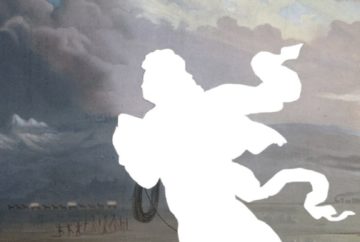 One day early in the pandemic, when schools and colleges first went online, my undergraduate students and I had just finished discussing an essay on the rise and decline of the innovative and powerful Comanche empire. I logged off and walked downstairs, where my elementary school-aged child was sitting at the dining table. “What did you learn in school today?” I asked, as I always do. He recounted to me—not in these exact words, of course—that North America had been an Edenic paradise before the Europeans arrived. I was shocked. This was the racist myth of the noble savage repackaged by the antiracist left. In reality, Native Americans did not need Europeans to introduce them to warfare, imperialism, slavery, or violence. This does not diminish the significant impact European pathogens and ambitions had on Native American polities. But to teach such distortive myths about the past? That’s the kind of thing historians should be upset about.
One day early in the pandemic, when schools and colleges first went online, my undergraduate students and I had just finished discussing an essay on the rise and decline of the innovative and powerful Comanche empire. I logged off and walked downstairs, where my elementary school-aged child was sitting at the dining table. “What did you learn in school today?” I asked, as I always do. He recounted to me—not in these exact words, of course—that North America had been an Edenic paradise before the Europeans arrived. I was shocked. This was the racist myth of the noble savage repackaged by the antiracist left. In reality, Native Americans did not need Europeans to introduce them to warfare, imperialism, slavery, or violence. This does not diminish the significant impact European pathogens and ambitions had on Native American polities. But to teach such distortive myths about the past? That’s the kind of thing historians should be upset about. A honey bee’s life depends on it successfully harvesting nectar from flowers to make honey. Deciding which flower is most likely to offer nectar is incredibly difficult. Getting it right demands correctly weighing up subtle cues on flower type, age, and history—the best indicators a flower might contain a tiny drop of nectar. Getting it wrong is at best a waste of time, and at worst means exposure to a lethal predator hiding in the flowers. In new research
A honey bee’s life depends on it successfully harvesting nectar from flowers to make honey. Deciding which flower is most likely to offer nectar is incredibly difficult. Getting it right demands correctly weighing up subtle cues on flower type, age, and history—the best indicators a flower might contain a tiny drop of nectar. Getting it wrong is at best a waste of time, and at worst means exposure to a lethal predator hiding in the flowers. In new research 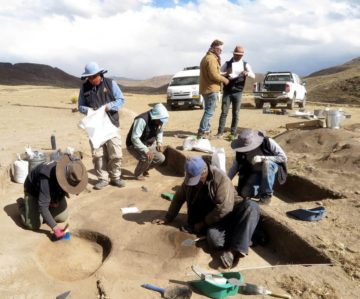 It’s often viewed as a given: Men hunted, women gathered. After all, the anthropological reasoning went, men were naturally more aggressive, whereas the slower pace of gathering was ideal for women, who were mainly focused on caretaking. “It’s not something I questioned,” said Sophia Chilczuk, a recent graduate of Seattle Pacific University, where she studied applied human biology. “And I think the majority of the public has that assumption.”
It’s often viewed as a given: Men hunted, women gathered. After all, the anthropological reasoning went, men were naturally more aggressive, whereas the slower pace of gathering was ideal for women, who were mainly focused on caretaking. “It’s not something I questioned,” said Sophia Chilczuk, a recent graduate of Seattle Pacific University, where she studied applied human biology. “And I think the majority of the public has that assumption.”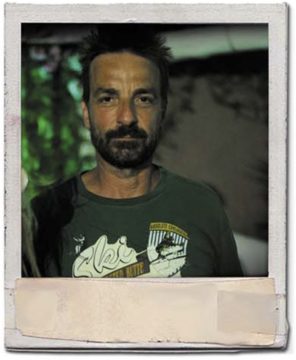 PATRICE RUNNER
PATRICE RUNNER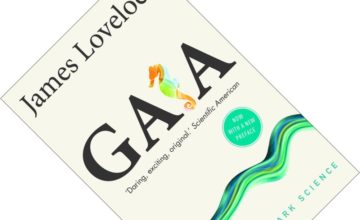 One year ago today, the famous scientist, environmentalist, and futurist James Lovelock passed away at the age of 103. Amongst his many achievements, he is best known for formulating the Gaia hypothesis: the notion that the Earth is a giant self-regulating system that maintains conditions suitable for life on the planet. I have always been somewhat suspicious of this idea but have simply never gotten around to properly reading up on it. High time to inform myself better and substantiate my so-far thinly-held opinion. Join me for a four-part series of book reviews in which I delve into Lovelock’s classic Gaia; his follow-up
One year ago today, the famous scientist, environmentalist, and futurist James Lovelock passed away at the age of 103. Amongst his many achievements, he is best known for formulating the Gaia hypothesis: the notion that the Earth is a giant self-regulating system that maintains conditions suitable for life on the planet. I have always been somewhat suspicious of this idea but have simply never gotten around to properly reading up on it. High time to inform myself better and substantiate my so-far thinly-held opinion. Join me for a four-part series of book reviews in which I delve into Lovelock’s classic Gaia; his follow-up  When one thinks of American pragmatism, one often puts too much emphasis on the American part. It might even stunt our enquiry, irrevocably fixating on thinkers such as John Dewey, William James, and Jane Addams. But there is more to the story of pragmatism than what happened in the United States around the turn of the
When one thinks of American pragmatism, one often puts too much emphasis on the American part. It might even stunt our enquiry, irrevocably fixating on thinkers such as John Dewey, William James, and Jane Addams. But there is more to the story of pragmatism than what happened in the United States around the turn of the 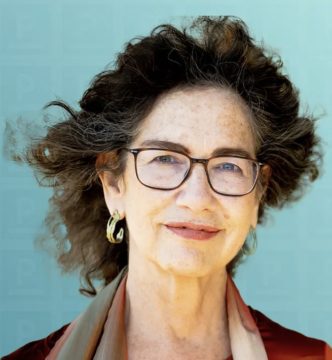 Susan Neiman: Well, I could also say that Woke Is Not Left. I wrote this book partly to figure out my own confusion. But it was a confusion that was reflected in conversations I have been having with friends in many different countries, all of whom, their whole lives, have stood on the side of the Left, and suddenly felt and said, “What is this? Maybe I’m not Left anymore.” And that struck me as wrong. But no one had quite teased out what the difference is and what the problems are. I didn’t want to give up the word “Left.” And I wanted to write a short book setting out what I consider to be left liberal principles as two different things and distinguishing them from the work in a nutshell. The very short thesis is that woke is fueled by traditional left-wing emotions, having your empathy for people who’ve been marginalized, wanting to correct historical discrimination and oppression. As you know, there’s a German saying that “your heart is on the left side of your body.” But the woke are undermined by what are actually very reactionary theoretical assumptions. And you do not have to have read Carl Schmitt or Michel Foucault in order to share those assumptions. Those assumptions have gotten into the water because every journalist went to college and picked up certain claims coming from these quite reactionary sources that are now often transmitted in the media as if they were self-evident truths. So, I wanted to show the gap between genuine left-wing philosophical assumptions and the premises that the woke are often acting on.
Susan Neiman: Well, I could also say that Woke Is Not Left. I wrote this book partly to figure out my own confusion. But it was a confusion that was reflected in conversations I have been having with friends in many different countries, all of whom, their whole lives, have stood on the side of the Left, and suddenly felt and said, “What is this? Maybe I’m not Left anymore.” And that struck me as wrong. But no one had quite teased out what the difference is and what the problems are. I didn’t want to give up the word “Left.” And I wanted to write a short book setting out what I consider to be left liberal principles as two different things and distinguishing them from the work in a nutshell. The very short thesis is that woke is fueled by traditional left-wing emotions, having your empathy for people who’ve been marginalized, wanting to correct historical discrimination and oppression. As you know, there’s a German saying that “your heart is on the left side of your body.” But the woke are undermined by what are actually very reactionary theoretical assumptions. And you do not have to have read Carl Schmitt or Michel Foucault in order to share those assumptions. Those assumptions have gotten into the water because every journalist went to college and picked up certain claims coming from these quite reactionary sources that are now often transmitted in the media as if they were self-evident truths. So, I wanted to show the gap between genuine left-wing philosophical assumptions and the premises that the woke are often acting on.